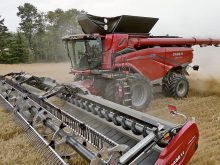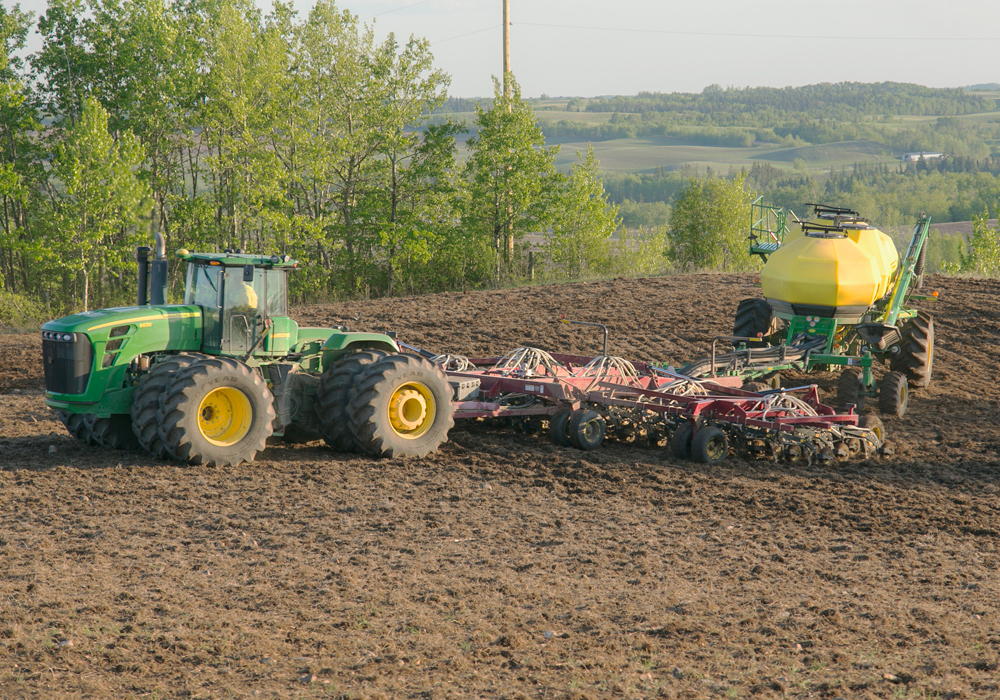Saskatchewan farmers are participating in a federally funded study to determine whether blended biodiesel can be used in farm equipment without hurting engine performance and on-farm fuel storage systems.
The study, conducted by the Saskatchewan Research Council (SRC) and funded by the National Renewable Diesel Demonstration Initiative (NRDDI), will test pre-blended diesel fuel that contains five and 10 percent biodiesel by volume, said Grant McVicar, director of bioenergy and bioresources with the SRC.
On-farm tests near Foam Lake, Sask., which began in August, will assess biodiesel performance in actual farm conditions for one year, giving researchers, fuel companies and farmers a better idea of whether the renewable fuel can safely be used in agricultural equipment, on-farm fuel storage systems and regional and national fuel distribution networks.
Read Also

Agri-business and farms front and centre for Alberta’s Open Farm Days
Open Farm Days continues to enjoy success in its 14th year running, as Alberta farms and agri-businesses were showcased to increase awareness on how food gets to the dinner plate.
“We’re not as concerned about fuel powering or power in equipment.… That has been relatively well demonstrated in various other studies,” McVicar said.
“What we are concerned about is fuel quality over a longer period of time.
“ Agriculture is probably one of the toughest situations for a fuel because farmers typically have on-site fuel storage and that fuel will often sit for several months and it’s also going to sit in the fuel tanks of combines and swathers for the next 10 months or so.
“We are really testing to see whether that fuel is going to retain its characteristics over a full season under what are very severe conditions.”
Canadian biodiesel use is expected to increase considerably over the next few years as governments take steps to reduce greenhouse gas emissions.
In British Columbia, the government is implementing a province-wide biodiesel mandate that requires highway traffic to use diesel that contains an average of five percent renewable fuel.
That mandate was supposed to take effect beginning this month but the availability of blended biodiesel has made implementation a challenge.
For example, blended biodiesel is not yet available in many northern communities and the cost of transporting blended fuel is prohibitive.
Alberta is due to implement a similar biofuel mandate this summer.
The federal government has indicated it intends to implement a mandatory renewable fuel mandate by 2012 that would require an average of two percent renewable fuel in every litre of diesel burned.
Many questions surround implementation of the federal mandate, but sources familiar with the process say no sector of the economy would be expected to adhere to the mandate until technical feasibility studies have been conducted and biofuel has been thoroughly tested to address performance concerns.
McVicar said the Foam Lake study represents a critical assessment of biodiesel’s feasibility for Canadian agriculture.
“If the federal government is going to put a renewable fuel standard in place, this will help to prove the fuel’s feasibility for the agriculture sector,” he said.
As part of the SRC study, eight farmers will burn blended biodiesel in diesel powered implements such as tractors, combines and swathers.
Five of the eight farmers will use a B5 biodiesel blend comprising five percent biodiesel and 95 percent petroleum diesel.
The other three producers will use a B10 blend for part of the year and a B5 blend when temperatures decrease and fuel clouding becomes a bigger concern.
The study will involve more than 50 farm machines and related farm fuel storage facilities, McVicar said.
Fuel quality tests will be conducted in the spring, after stored fuel has been sitting for an entire winter, and again in the fall, when harvest equipment is started.
Zenneth Faye, executive manager of Saskatchewan biodiesel manufacturer Milligan Biotech, said the SRC study is an important step in convincing government and the petroleum industry that biodiesel is a legitimate and trouble-free substitute for petroleum diesel fuel.
He said most agricultural producers know that biodiesel performs well in farm machinery and provides improved lubricity.
“It’s not so much the functionality of the product,” Faye said.
“It’s is more for the regulatory side of biofuels … and for industry because the fuel companies want to be assured that there are not going to be any implications in long-term storage.”
Diana Roca-Baltzis, an official with Natural Resources Canada, said the National Renewable Diesel Demonstration Initiative has provided funding for seven pilot projects in the forestry, construction, rail, agricultural, petroleum and hydro electrical sectors.
Another study conducted by the Alberta and federal governments and Shell Oil tested low-level biodiesel blends in Alberta trucking fleets between December 2007 and 2008.
That test, known as the Alberta Renewable Diesel Demonstration, confirmed the operability of low level renewable diesel blends in cold weather conditions, according to Climate Change Central, the government agency that managed the project.
McVicar said the SRC study will cost $782,000. A final report is expected by November.















